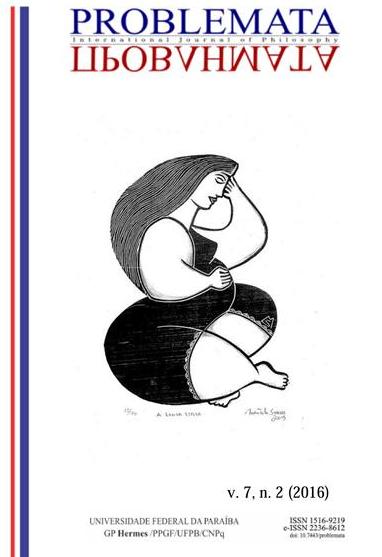TRANSCENDENTAL APPERCEPTION IN THE CRITIQUE OF PURE REASON: INFLUENCE OF PREVIOUS PHILOSOPHICAL WRITINGS AND THEIR INHERITED REAPPLICATION
DOI:
https://doi.org/10.7443/problemata.v7i2.29291Palavras-chave:
Crítica da razão pura. Apercepção transcendental. Permanência. Espontaneidade.Resumo
Resumo
Na Crítica da razão pura, Kant desenvolveu novas perspectivas sobre a apercepção nunca contempladas antes na história da filosofia. Mas, nem tudo o que o autor da primeira Crítica escreveu possui raízes originais. Kant reaplicou muito do que aprendeu com o passado histórico-filosófico, pelo qual foi profundamente influenciado, de um modo inovador criando novas abordagens sobre a apercepção. Este artigo tem por objetivo esclarecer como Kant aprendeu com os filósofos do passado para desenvolver o conceito de apercepção transcendental na Crítica da razão pura.
Abstract
In the Critique of Pure Reason, Kant developed new perspectives on apperception never before contemplated in the history of philosophy. However, not everything that the author of the first Critique wrote was entirely original. Indeed, Kant reapplied much that he had learned from historical philosophy, by which he was deeply influenced, creating innovative new approaches to apperception. This article aims to explain how Kant learned from the philosophers of the past in order to develop the concept of transcendental apperception in the Critique of Pure Reason.
Keywords: Critique of Pure Reason. Transcendental apperception. Abidance. Spontaneity.
Downloads
Referências
AMERICKS, Karl. Kant's Theory of Mind: An Analysis of the Paralogisms of Pure Reason, 2nd edition. Oxford: Oxford University Press, 2000.
BROOK, Andrew. Kant's View of the Mind and Consciousness of Self. The Stanford Encyclopedia of Philosophy. Edward N. Zalta (ed.). (WEB = URL: http://plato.stanford.edu/archives/fall2013/entries/kant-mind/, 2013).
COTTINGHAM, John. Dicionário Descartes. Tradução de Helena Martins / Revisão Técnica de Ethel Alvarenga. Rio de Janeiro: Jorge Zahar, 1995.
DESCARTES, René. Meditations on first philosophy. Translated by Elizabeth S. Haldane, In: The Philosophical Works of Descartes (Cambridge University Press), 1911.
______. The Principles of Philosophy. Translated by E. Haldane and G. Ross. Cambridge: Cambridge University Press.
Et al. The Routledge companion to epistemology. Edited by Sven Bernecker, Duncan Pritchard. Routledge philosophy companions, 2011.
ERTL, Wolfgang. Hume’s antinomy and Kant’s critical turn. British Journal for the History of Philosophy, v. 10, n. 4, pp. 617-640, 2002.
GARDNER, Sebastian. Routledge Philosophy Guidebook to Kant and the Critique of Pure Reason. First published by Routledge, New Fetter Lane: London, 1999.
GULICK, Van Robert. Consciousness. The Stanford Encyclopedia of Philosophy. (Spring 2014 edition), Edward N. Zalta (ed.), URL = http://plato.stanford.edu/archives/spr2014/entries/consciousness/
GUYER, Paul. A dedução transcendental das categorias. In: Kant (Org. Paul Guyer), tradução de Cassiano Terra Rodrigues. Aparecida: Ideias e Letras, 2009.
______. Kant and the Claims of Knowledge. Cambridge: Cambridge University Press, 1987.
______; HOSTMANN, Rolf-Peter. Idealism. The Stanford Encyclopedia of Philosophy (fall 2015 edition), Edward N. Zalta (ed.), URL = <http://plato.stanford.edu/archives/fall2015/entries/idealism/>.
HENRICH, Dieter. The proof-structure of Kant’s transcendental deduction. The Review of Metaphysics, v. 22, n. 4, pp. 640-659, 1969.
______. Self-consciousness a critical introduction to a theory. Man and World v. 4, n. 1, 1971.
HUME, David. A treatise on human nature. Edited, with an analytical index, by L.A. Selby Bigge. Oxford: Clarendon Press, 1896.
JESUS, Paulo. “I think” as form and action: Kant’s self beyond time and substance. Estudos Kantianos, Marília, v. 3, n. 2, pp. 163-180, 2015.
KANT, Immanuel. Critique of Pure Reason. Edited and translated by Paul Guyer and Allen Wood. The Cambridge edition of the works of Immanuel Kant. United Kingdom: Cambridge University Press, 1998.
KITCHER, Patricia. Kant on self-consciousness. The Philosophical Review, v. 108, n. 3, 1999.
LEIBNIZ, Gottfried Wilhelm. Discourse on Metaphysics. Translated by D. Garter and R. Aries. Indianapolis: Hackett.
LOCKE, John. An essay concerning the human understanding. The Pennsylvania State University (Electronic Classics Series), 1999.
RAUSCHER, Frederick. Kant and the demands of self-consciousness. Journal of the History of Philosophy, v. 38, n. 2, pp. 285-287, 2000.
STURM, Thomas; WUNDERLICH, Falk. Kant and the scientific study of consciousness. History of the Human Sciences, v. 23, n. 3, pp. 48-71, 2010.
VALARIS, Markus. Inner Sense, Self-Affection and Temporal Consciousness in Kant’s Critique of Pure Reason. Philosophers’ Imprint, v. 8, n. 4, 2008.
Downloads
Arquivos adicionais
Publicado
Edição
Seção
Licença
Autores que publicam nesta revista concordam com os seguintes termos:
- Autores mantém os direitos autorais e concedem à revista o direito de primeira publicação, com o trabalho simultaneamente licenciado sob a Licença Creative Commons Attribution que permite o compartilhamento do trabalho com reconhecimento da autoria e publicação inicial nesta revista.
- Autores têm autorização para assumir contratos adicionais separadamente, para distribuição não-exclusiva da versão do trabalho publicada nesta revista (ex.: publicar em repositório institucional ou como capítulo de livro), com reconhecimento de autoria e publicação inicial nesta revista.
- Autores têm permissão e são estimulados a publicar e distribuir seu trabalho online (ex.: em repositórios institucionais ou na sua página pessoal) a qualquer ponto antes ou durante o processo editorial, já que isso pode gerar alterações produtivas, bem como aumentar o impacto e a citação do trabalho publicado (Veja O Efeito do Acesso Livre).







